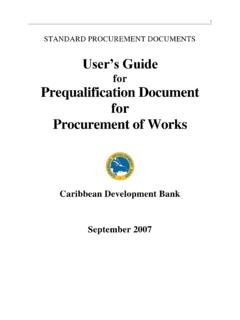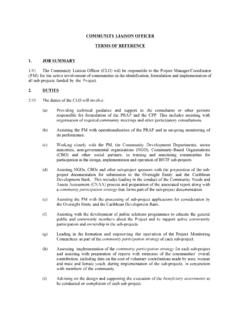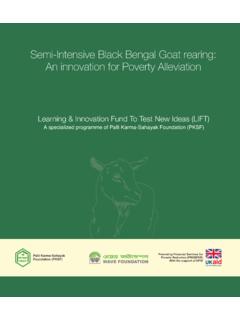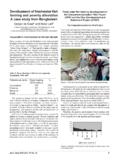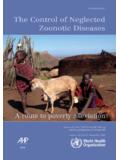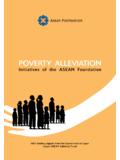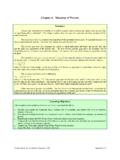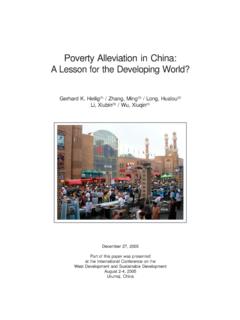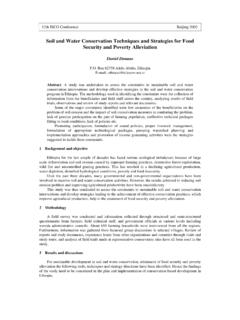Transcription of POVERTY AND ITS ALLEVIATION IN THE …
1 POVERTY AND ITS ALLEVIATION IN THE caribbean Lecture by Professor Compton Bourne, PhD., President, caribbean development bank at the ALFRED O. HEATH DISTINGUISHED SPEAKERS FORUM UNIVERSITY OF THE VIRGIN ISLANDS Monday, March 14, 2005 PREAMBLE I am honoured to have been invited to deliver this year s Alfred O. Heath Distinguished Speaker s Lecture. Dr. Heath has distinguished himself in the field of medical surgery, academia and the arts and culture. He is a model of commitment to improving the welfare of the members of his society. It is my hope that the subject of my lecture, POVERTY and its ALLEVIATION in the caribbean does justice to the tradition he has established.
2 I must also say that it is a real pleasure to be back at the University which I started visiting in the mid-1970s when it was quite young. I am very gratified to observe its growth into a vibrant centre for higher education and learning dedicated to widening access to education and expanding life opportunities of members of caribbean society, especially the young. This is no doubt due to the excellence and dedication of its current and former Presidents and Faculty through the years, some of whom it has been my distinct privilege to know and to have worked with. I. INTRODUCTION POVERTY reduction is an almost universal objective.
3 It finds expression in the strategies and programmes of multilateral institutions, national governments, bilateral aid agencies and regional and sub-regional development banks. It is the first of the eight Millennium development Goals for improving human welfare enunciated by the United Nations General Assembly in 2000. In the caribbean , POVERTY reduction is the overarching objective in the caribbean development bank s Strategic Plan 2000-2004 and will remain a central objective in the Strategic Plan for 2005-2009. II. NATURE AND MEANING OF POVERTY The poor are to be found everywhere in the world in developing countries and in developed countries, but is the standard of measurement or identification the same?
4 The Millennium development Goal for POVERTY reduction sets the target of reducing by one-half, the number of people living on less than $1 a day by the year 2015. Timothy Besley and Robin Burgess in a study entitled Halving Global POVERTY published in 2003 correctly noted that while the dollar-a-day line is representative of domestic POVERTY lines in low income countries, it does not correspond well with what is judged as POVERTY in the middle income would be unthinkable in developed countries . Since caribbean countries with a few exceptions would be classified as middle income countries on the basis of their per capita income levels, dollar-a-day would seem to be of limited relevance to the caribbean as a measure of absolute POVERTY .
5 Furthermore, the poor may be better off, less poor, in some countries than in others in the Bahamas, the Virgin Islands, and in Barbados than in Guyana, Haiti and Suriname. What then do we mean by poor ? One can of course proceed by way of declarative statements such as the one found in the World development Report 2001: POVERTY is pronounced deprivation in well-being. But declarative statements while memorable do not usually illuminate. They require elaboration, as the World development Report immediately acknowledges by posing and answering the question: what precisely is deprivation? The answer is a description of the state of POVERTY , POVERTY in terms of living conditions: To be poor is to be hungry, to lack shelter and clothing, to be sick and not cared for, to be illiterate and not schooled.
6 Influenced by the profound work of Amartya K. Sen on development and POVERTY , the status of being poor has been extended beyond income levels and income-associated conditions such as health and education to include what Sen terms unfreedoms such as tyranny or bad treatment by the State and exclusion from participation in decisions, particularly those directly affecting the poor themselves. In more recent work, the status definition of POVERTY also refers to acute vulnerability to economic shocks and natural hazards. Generally, there are two main definitional approaches which find application in the measurement and analyses of POVERTY and in policies and programmes for POVERTY ALLEVIATION .
7 The first and prevalent is the income or monetary approach which addresses the issue of resources available to the person or household to effect a standard of living. When the monetary or income situation of the person or household is set against an arbitrarily determined standard of living, one gets an absolute POVERTY line. When it is set against some average for the society, one gets a relative POVERTY line. Dollar-a-day is an absolute standard it is what a person is estimated to need for provision of a defined level of basic necessities. The European Union standard of 60% of median income is a relative standard a person is adjudged to be poor through comparison with the average for the society.
8 As Laderchi, Saith and Stewart (2003) comment: From a political point of view, a relative standard makes sense as people s toleration of POVERTY and governments willingness to take action against it is generally relative to average standards in that society. It s also true that the sense of deprivation or unhappiness caused by POVERTY is greatly influenced by average societal standards . They note that relative standards are adopted more in developed countries than in developing countries, and vice versa. The second approach is the capabilities approach the ability to be and do a variety of things. This approach is linked to Sen s work, especially on the interpretation of development as a process of expanding the real freedom that people enjoy.
9 The removal of major sources of unfreedom:: POVERTY as well as tyranny, poor economic opportunities as well as systematic deprivation, neglect of public facilities as well as intolerance or overactivity of oppressive states (Sen 1999). POVERTY , then, is deprivation of basic capabilities. The capabilities approach not only changes the measurement focus in POVERTY assessments, it alters quite significantly policy approaches to POVERTY ALLEVIATION by directing attention to the need to strengthen the capabilities of individuals and households to take action for improvement of their own welfare. It directs attention to political and social constraints and to economic constraints external to the individual or household, and it emphasises the importance of participatory democracy.
10 POVERTY reduction programmes, such as the CDB s Basic Needs Trust Fund, now tend to have built-in provisions for community involvement in project identification project design, project implementation and project governance and include social and physical infrastructure in communities eg. health centres, water supply systems, and roads, as instruments of capabilities enhancement. III. POVERTY IN THE caribbean Surveys of living conditions conducted in many caribbean countries between 1996 and 2002 provide a basis for assessing the incidence of POVERTY in the sub-region. The surveys measure both income or monetary POVERTY and non-income POVERTY .




